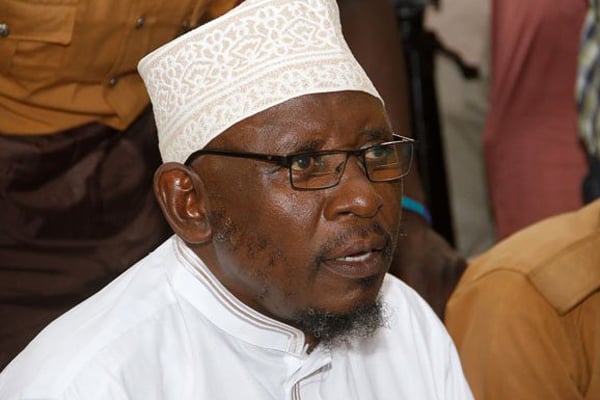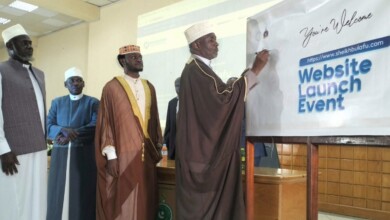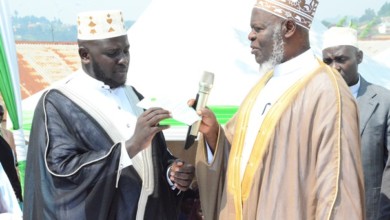Sheikh Kamoga walks tightrope in a bid to deregister Mosques

By Jafar Mugera
On August 9, Sheikh Muhammad Yunus Kamoga, Amir Ummah of the Nakasero Mosque-based Jamuiyya Tabligh Da-awah Salafiyyah, took his campaign against registering mosques as companies to Masaka. At Masjid Jamia – Magoba on Elgin Street, he met Tabligh leaders to warn them against incorporating mosques as private entities, insisting that mosques must remain communally owned.
“I will no longer announce my visits, and I don’t need to move with an entourage to fulfil my mandate,” the tough-talking Sheikh Kamoga told the Masaka Tabligh leaders. “I will reach every corner of this country where any of our mosques is registered as a company, remove the leadership, and appoint a new board of trustees to manage the mosque’s affairs and any other properties attached to it,” he added.
Kamoga’s discomfort with the mosque registrations first came to the fore last month at the Islamic University in Uganda (IUIU) Females’ campus at Kabojja, near Kampala, during a one-retreat for Imams from Lubaga and Bombo Divisions. However, the Masaka leadership is not buying the idea of registering their mosques under the trustees appointed by Kamoga. Leaders at Magoba are preparing to mobilize members to pay him a visit and present their concerns. The imams there argue that Muslim properties are already safe under their current registration as companies—so much so that they recently expanded their board from four to five members.
Sheikh Umar Sserunjogi, the spokesman of the Masaka Tablighs said that while Kamoga’s plan could have some benefits, there is a possibility of abuse in the future. “This idea may be good, but it could be misused by another leader who comes after Sheikh Kamoga. Our properties are safer in their current state than having them all registered under Nakasero, as the Amir wishes,” Sserunjogi argued.
Masjid Jamia – Magoba is one of the well-endowed Tabligh mosques in Masaka City that incorporated a company to manage its properties. It is understood that other mosques in areas such as Nyendo, Katwe, Kitenga, and Kyabakuza—many with well-established schools and health centres—were also registered privately, much to Kamoga’s chagrin.
Legal expert weighs in
Hajji Mukasa Sirajeh Katantazi, the Chief Executive Officer at the Uganda Muslim Lawyers Association (UMLAS) countered Sheikh Kamoga’s position, noting that the registration status could instead help Muslim communities develop.

“That (Sheikh Kamoga’s) fear is not legally sound. In fact, when used wisely, this structure offers communities more protection, flexibility, and transparency than the alternative of registering solely as a trust,” Katantazi said.
A Company Limited by Guarantee (CLG) is a corporate non-profit whose members’ liability is limited to a nominal “guarantee” amount, payable only if the organisation winds up. Its governance—how decisions are made, leaders chosen, and disputes resolved—is set out in the Memorandum and Articles of Association (Memarts), alongside the oversight of an Annual General Meeting.
“For a community mosque, this means you can clearly define members’ rights, the process for appointing or removing directors, and how to resolve disagreements without leaving these crucial matters to chance,” he added.
Katantazi advised that such a company must file annual returns and present financial records to its members at the AGM. It can also appoint an external auditor to give an independent opinion on the books.
“This statutory framework helps keep leaders answerable to the congregation and donors. Unlike trusts, a CLG can lawfully engage in a wide range of activities—schools, health centres, waqf projects, zakat programmes—alongside the core religious duties of prayer, da‘wah, and preaching,” he noted.
Katantazi urged mosques to consider registering as Companies Limited by Guarantees and as Trusteeships.
“The strongest legal structure is a hybrid. Use a CLG as the operating body to run worship, madrasa, welfare programmes, staff, finances, and Uganda Revenue Authority compliance, and incorporate a trusteeship to hold title to land and immovable waqf assets, ring-fencing sacred property from operational risks.”





